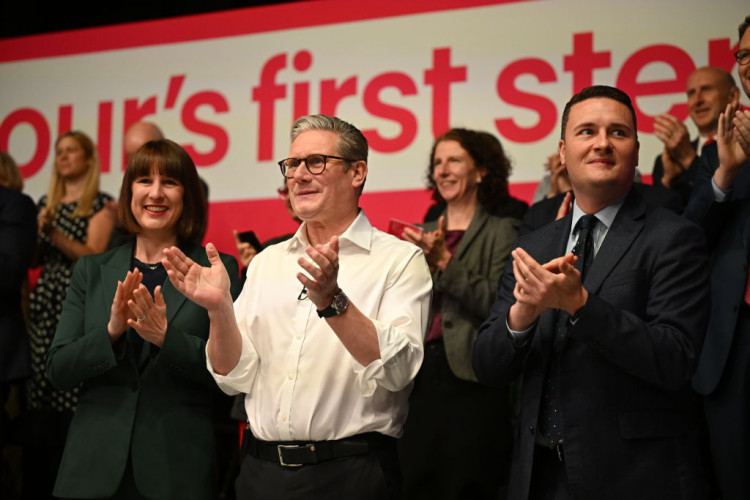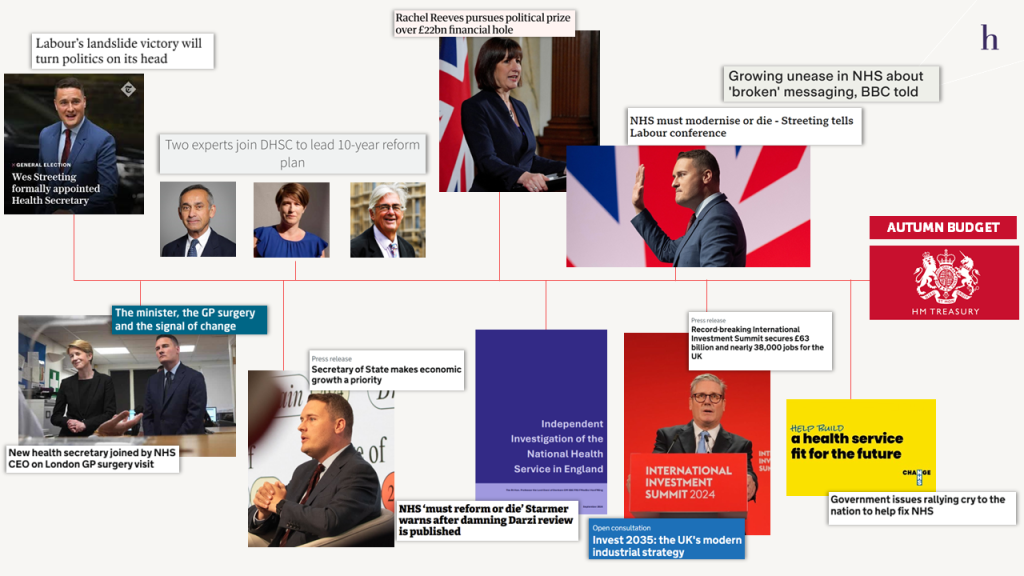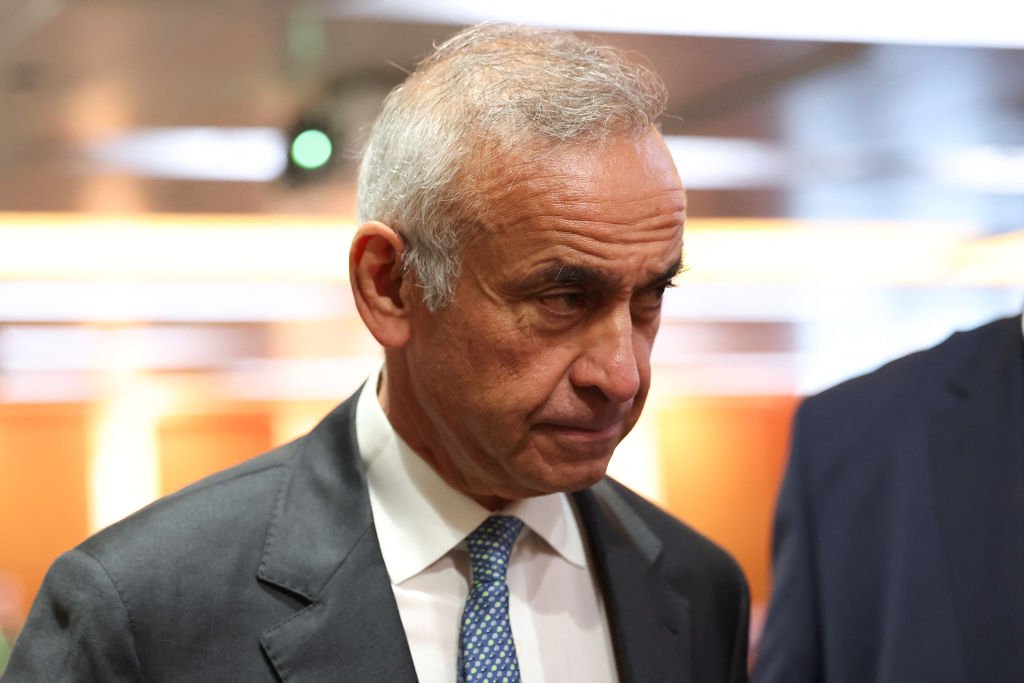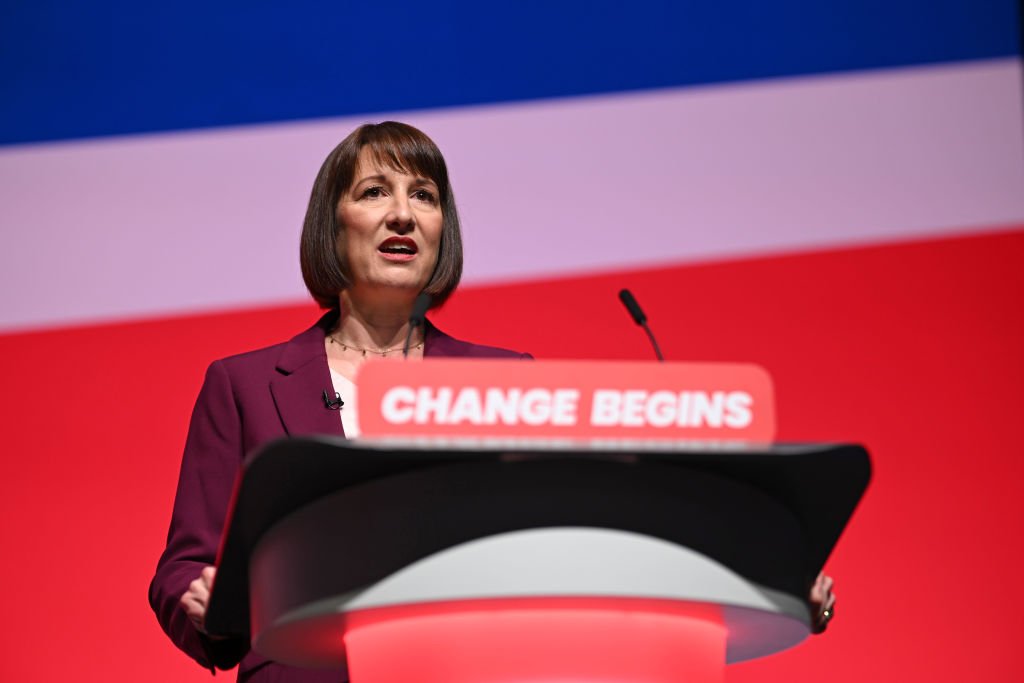The Autumn Budget is likely to be a critical juncture for health policy, setting the tone for the scope and speed of future reforms and investments. In this blog, I delve into the key events and decisions leading up to this pivotal moment and offer insights into what the Autumn Budget may mean for the future of health policy in the UK.
4th July: Labour wins the General Election
Labour's landslide victory of 411 seats on the 4th of July gave Starmer the mandate to pursue a more ambitious policy agenda, moving beyond Labour’s ‘Ming vase’ strategy. However, this historic win was clouded by a particularly challenging inheritance: a fiscally constrained environment and public services in disarray. The state of the health system was no exception, with public confidence in the NHS at a historic low, significant elective backlogs and worsening patient outcomes.
8th July: Streeting’s first visit to a GP surgery
Days after the historic win, the newly appointed Secretary of State for Health and Social Care, Wes Streeting MP, decided on a GP surgery for his first visit rather than the customary hospital visit – a clear affirmation of the Government’s commitment to moving care from hospital to the community. The implication of this? An increased share of the NHS budget will be spent on primary and community care. Although, implementation of this budgetary adjustment will likely be a challenge for the Department of Health and Social Care (DHSC), a challenge anticipated to be addressed through the implementation of new financial flow mechanisms.
9th July: Streeting announced that economic growth will be a central focus of DHSC
On his fifth day as Health Secretary, Streeting announced what became the first clear sign of the close relationship we have seen between the delivery of the Government’s growth and health missions; an encouraging stance for industry, especially considering that collaboration between NHS, the life sciences industry and medical technology companies was noted in the announcement as a central method for the DHSC to deliver growth.
11th July: Streeting appoints experts
As Streeting neared the end of the Government’s second week in power, he announced plans to initiate the identification of the most urgent issues facing the NHS through Lord Ara Darzi’s national review of the performance of the NHS. The Darzi review will inform the NHS 10-year plan to be developed by the Director General, Sally Warren, former Director of Policy at the King’s Fund. Alongside this, Paul Corrigan was appointed Strategy Adviser in DHSC to lead on political strategy, indicating Streeting aspires to recreate a politically controlled strategy unit reminiscent of the Alan Milburn era.
29th July: Chancellor of the Exchequer, Rachel Reeves announces £22 billion black hole
Driven by an ambition to solidify future electoral success and garner public support in the face of fiscally constrained progress on policy commitments, the Government concluded their first month in power with a sobering announcement of a £22 billion black hole in public finances. This laid the foundations for the significant emphasis on the poor inheritance we have seen Ministers opt for in their messaging.
12th August: Lord Ara Darzi’s Review of the NHS published
Critiquing NHS performance over the last 14 years and laying out the extent of the issues facing the health service, the Review provided independent evidence for Wes Streeting’s claim that the ‘NHS is broken’, supporting the political positioning of the Government’s poor inheritance.
22nd – 25th September: Labour Party Conference
Despite this being the first party conference with the Labour Party in power in 15 years, the Party faced a storm of challenging headlines during conference, leading to a flatter than expected atmosphere. A significant 21-point decline in the Prime Minister’s popularity suggested that Starmer’s message of “light at the end of the tunnel” did not quite cut through to the general public in the way Government might have hoped. This provoked an infiltration of messages about the Government’s optimistic long-term vision within their overarching rhetoric related to the scope and scale of the challenges they face. Despite the overall mixed tone, health events were overflowing with queues out the door - a clear indication of the sector’s eagerness to collaborate.
Ahead of Streeting’s speech, NHS England raised concerns about the long-term impact of the ‘NHS is broken’ message on public confidence and workforce satisfaction in the NHS. Nonetheless, Streeting maintained his focus on the deterioration of the NHS caused by Conservative management, although pockets of messaging related to hope and future optimism were scattered throughout. Notably, Streeting used his speech to tease what has become DHSC’s modus operandi of delivering three key shifts: from hospital to community, from analogue to digital, and from sickness to prevention.
14th October: International Investment Summit & Invest 2035 Consultation
Following a post-Party Conference waver in the Government’s popularity ratings, Reeves declared that her optimism for Britain “burns brighter than ever” at the Government’s International Investment Summit, indicating that a shift to a more solutions-oriented approach was fully underway. With the life sciences sector named as offering ‘the highest growth opportunity for the economy and business’, the Government set out the necessity of working in partnership with industry to achieve their ambition to reform and reimagine the NHS. The Summit concluded with the publication of the Invest 2035 Green Paper and Consultation ahead of its publication in spring 2025. Outlining the potential the life science sector has in driving economic growth and productivity, while also improving health outcomes, the Green Paper solidified the Government’s commitment to realising the economic potential of the life sciences industry.
21st October: Government publishes consultation on the NHS 10 Year Health Plan
The inception of a pivotal plan to establish long-term priorities for health policy in the UK, the consultation for the NHS 10 Year Health Plan launched on the 21st of October, with the Plan’s expected publication due in spring 2025.
Diverging from the format of the Major Conditions Strategy developed by the previous Government, the consultation will operate with a non-disease specific format, instead centring around the DHSC’s three key shifts: from hospital to community, from analogue to digital, and from sickness to prevention. This is a fundamental repositioning in policymaking for DHSC, meaning that stakeholders will need to present their policy asks in a format that aligns with one of the overarching shifts, rather than the conventional disease area engagement. Whilst this takes on a more ambitious approach and ultimately aims to achieve comprehensive reform in the NHS operation unlike that we have ever seen before, it perhaps risks overlooking the need to tackle the UK’s biggest killers directly.
The consultation includes a collaborative platform for stakeholders, including members of the general public - which has seen a multitude of outrageous and far-fetched responses submitted. However, this platform is unlikely to be the central method for the DHSC to engage on; instead, it is anticipated that several working groups will be established to address key topics and engage with stakeholders on the specific issues they are set to explore. The working groups are expected to cover priority areas for DHSC, such as the life sciences and digital innovation.
What is to come next for the Government...
30th October: Autumn Budget
Industry stakeholders are waiting anxiously to see if DHSC’s efforts to establish the scale and scope of the challenges embedded in the ‘broken’ NHS have succeeded in securing sufficient funding to support the initiation of reform, rather than simply survival. However, the extent of the fiscal challenges facing the Government, alongside the restraints on spending imposed by Reeves’ stringent fiscal rules and ruling out of certain tax rises mean that is it unlikely we will see a revolutionary Budget.
The NHS is expected to receive an uplift to help tackle waiting lists, however the recent pay settlements, touted as one of Streeting’s key achievements so far, will cancel this uplift out. With Reeves’ alteration to the debt calculation, capital investment is anticipated to be allocated on new investment for infrastructure projects, including new hospitals.
The Treasury will likely opt to disperse the necessary funding to tackle key issues and implement reforms across the next four spending reviews. Streeting has already announced that he has agreed a plan for NHS funding with the Chancellor, and the Spring Budget is anticipated to be a significant milestone in initiating these changes. Reports have suggested the Government will be allocating up to £10 billion for the NHS in spring.
As we head into a challenging winter, the question remains of what to expect from the budget for the health service, and whether it will go beyond basic survival to enable Streeting to begin his planned reform. And despite the recent optimistic notions from Government on industry collaboration to ensure a thriving sector, what will be left for the life sciences?
Ultimately, the Government need this Budget to serve as a ‘reset Budget’, with the scale and speed of public service reform acting as the political imperative the Government must deliver on to win the next election. However, in reality, it is anticipated to be a Budget that is unlikely to offer anything but difficult choices and a reminder of the challenging inheritance the Government faced coming into power.










